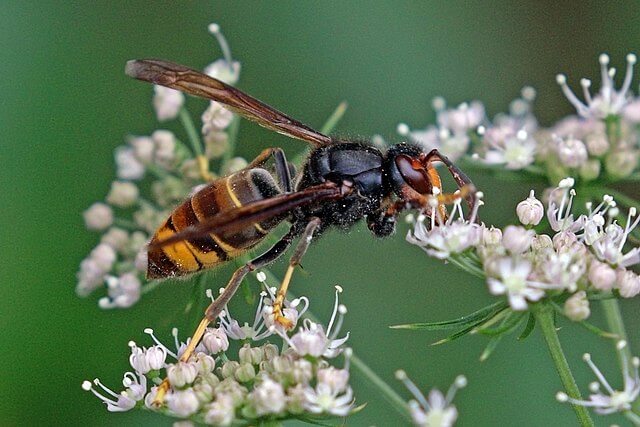
The UK’s bee populations face a dire threat as record sightings of Asian hornets, invasive predators wreaking havoc in mainland Europe, intensify concerns.
These menacing insects pose a potential catastrophe for the UK’s biodiversity, as they have already established nests in various regions, including East Sussex, Kent, Devon, and Dorset. Feeding voraciously on native bees and wasps, the Asian hornets are detrimental to the nation’s ecosystem.
These concerns come in the wake of a global report released by leading scientists, which highlights the looming threats posed by invasive species. These “alien invaders” are organisms transported around the world by human activity into regions where they wouldn’t naturally occur. They encompass species like Japanese knotweed and the fungus responsible for the destruction of ash trees. Invasive species represent one of the five primary drivers of biodiversity loss, and their impact is projected to escalate.
The report reveals alarming findings:
- Invasive species present a substantial threat to nature, food security, and human health.
- They contribute to a staggering 60% of global extinctions, underscoring their devastating impact on ecosystems.
- The economic costs associated with invasive species have surged to over £300 billion ($380 billion) annually worldwide.
- These costs have been quadrupling each decade, reaching $423 billion (£336 billion) in 2019.
The threat to the UK’s bee populations from Asian hornets serves as a tangible example of how invasive species can establish a permanent foothold in new regions. In Kent, beekeeper Simon Spratley is grappling with the grim consequences for his bees. He reports that the Asian hornets, with their penchant for preying on bees, have led to the loss of 10 out of 17 hives in quick succession.
“These insects are going to settle here and they’re going to predate on all insects especially the honey bee – that’s their natural food source,” he warns.
“They’ll end up destroying or over complicating bee keeping for everybody and reducing the [bio] diversity in the Kent area and the whole wider England.”
Further north, near Ashford, a team of experts from the National Bee Unit, a division of the Animal and Plant Health Agency, is actively addressing the problem. They are tasked with locating and eradicating Asian hornet nests following positive identifications in the area.
Peter Davies, a bee inspector, notes that this time of year is when Asian hornets are most likely to be spotted, possibly in gardens while feeding on fruit. While the Department for the Environment emphasises that Asian hornets pose no greater risk to human health than other wasps or hornets, they can inflict significant damage on honeybee colonies and other beneficial insects.
“Please take a picture, go on the Asian hornet app, have a look – compare it and please report it,” he says.
The public is urged to exercise extra vigilance and immediately report any sightings of these invasive predators. It is crucial to avoid approaching or disturbing their nests.
“By ensuring we are alerted to possible sightings as early as possible, we can take swift and effective action to stamp out the threat posed by Asian hornets,” said chief plant and bee health officer Nicola Spence.
Disturbingly, there have been 22 confirmed sightings of Asian hornets in 2023, which exceeds the total for the previous six years combined. This is a significant increase from just two confirmed sightings in 2022, two in 2021, and one in 2020. While native to Southeast Asia, Asian hornets can be transported globally in cargo and have become widespread in mainland Europe, posing a substantial risk to the UK.
“We are transporting all sorts of plants and animals – fungi even – outside of their native ranges to places where the local environment has not evolved along with them, so they cause many threats to food security, to our native animals and plants,” says Dr Gavin Broad of the Natural History Museum in London.
The report by 86 biodiversity experts underscores the dire consequences of invasive species, both ecologically and economically. Co-author Professor Helen Roy of the UK Centre for Ecology and Hydrology notes that climate change is likely to exacerbate the situation.
“The future threat from invasive alien species is a major concern. 37% of the 37,000 alien species known today have been reported since 1970 – largely caused by rising levels of global trade and human travel.”
However, she highlights the value of preventive measures, citing efforts to keep the Asian hornet out of Britain as a noteworthy example. These efforts demonstrate that proactive measures can play a crucial role in safeguarding ecosystems and mitigating the threats posed by invasive species.
——————————————————————————
At Natural World Fund, we are passionate about stopping the decline in our wildlife.
The decline in our wildlife is shocking and frightening. Without much more support, many of the animals we know and love will continue in their decline towards extinction.
When you help to restore a patch of degraded land through rewilding to forests, meadows, or wetlands, you have a massive impact on the biodiversity at a local level. You give animals a home and food that they otherwise would not have had, and it has a positive snowball effect on the food chain.
We are convinced that this is much better for the UK than growing lots of fast-growing coniferous trees, solely to remove carbon, that don’t actually help our animals to thrive.
This is why we stand for restoring nature in the UK through responsible rewilding. For us, it is the right thing to do. Let’s do what’s right for nature!
Donate today at https://naturalworldfund.com/ and join in the solution!

